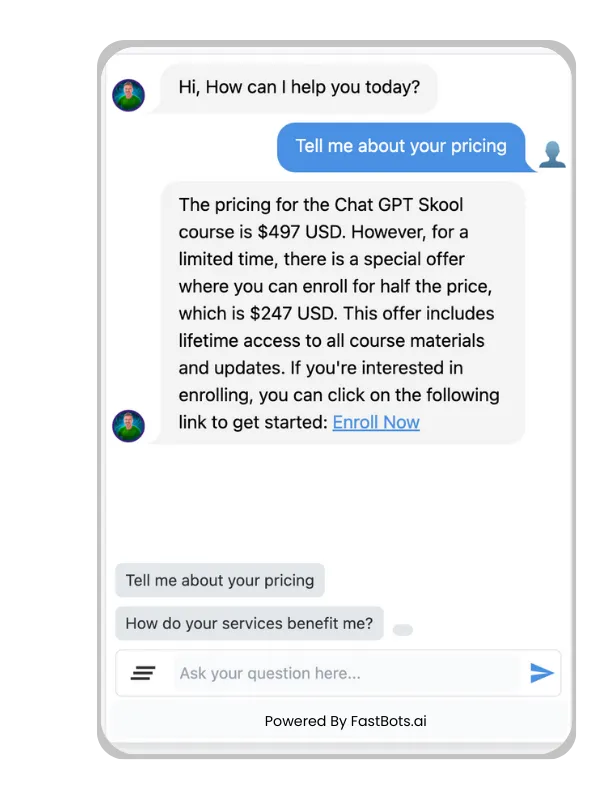In today's competitive business landscape, it is essential for companies to explore new opportunities for growth and innovation. One such opportunity lies in white-label chatbot partnerships. These collaborations allow businesses to offer AI-powered conversational services under their brand without investing resources in developing the technology from scratch.
White-label chatbot partnerships not only help to expand your service portfolio but also improve your company's financial performance. By leveraging advanced conversational AI technologies, you can enhance customer experiences, streamline internal processes, and ultimately boost your business's bottom line.
In the following paragraphs, we will delve into the benefits and potential collaborations offered by white-label chatbot partnerships, providing insight into how you can utilise this innovative approach to elevate your business.
Identifying potential partnerships
Criteria for an Ideal Partnership
To identify ideal white-label chatbot partnerships for your business, consider the following factors:
1. Relevance: Ensure the chatbot provider serves your specific industry or customer base, as well as aligns with your company's values and goals.
2. Customisation: Look for a chatbot partner that offers extensive personalisation options, as it will help project a seamless integration with your brand image.
3. Scalable and adaptable: A reliable provider will have the ability to smoothly scale the chatbot system to accommodate your business growth and adapt to ever-changing customer demands.
4. Technical expertise: The partner should possess a solid technical background, enabling them to provide cutting-edge chatbot solutions with minimal downtime.
5. Support: Prioritise chatbot partners capable of offering swift and proactive assistance, as well as regular maintenance and updates.
Industry Analysis
To identify and pursue promising white-label chatbot partnerships, it is crucial to conduct an in-depth analysis of the chatbot market within your target industry. Here are some key areas to explore in your research:
1. Competitors: Determine how your competition leverages chatbot technology and assess their partnerships. Learn from their successes and shortcomings to refine your partnership strategy.
2. Market trends: Stay informed on current and emerging trends shaping chatbot usage in your industry, such as AI advancements and changing customer preferences.
3. Demands and gaps: Identify existing demands and any unmet needs within your industry that a white-label chatbot could potentially fulfil. This will help you pinpoint where your business can stand out with a unique offering.
4. Case studies: Analyse the real-world results of similar organisations that have successfully implemented chatbot partnerships. This provides valuable insights on best practices, common challenges, and feasible expectations.
By thoughtfully selecting your chatbot partner and staying informed about your industry, you can effectively strengthen your business offerings while delivering top-notch customer experiences.
THE EASIEST WAY TO BUILD YOUR OWN WHITE LABEL AI CHATBOT
In less than 5 minutes, you could have an AI chatbot fully trained on your business data assisting your Website visitors.
Building a White-Label Chatbot Strategy
Customisation and branding
When developing a white-label chatbot strategy, it's crucial to prioritise customisation and branding. By selecting a reliable white-label chatbot solution, you have the advantage of easily tailoring the chatbot to align with your brand's identity. This offers faster market entry and cost savings while providing a seamless experience for your customers.
Here are a few aspects to consider:
1. Chatbot's name and voice: Ensure your chatbot reflects your brand's personality and tone of voice. This will help create a consistent customer experience.
2. Visual elements: Customise the chatbot interface to incorporate your brand colours, logo, and design elements, helping users identify with your business.
3. Pre-defined responses: Adapt the chatbot’s responses to mirror your brand’s communication style and ensure it offers accurate information relevant to your products and services.
Integration and compatibility
For a successful white-label chatbot strategy, it's essential to focus on integration and compatibility with your existing systems. Examine the following integration aspects:
- CMS and CRM platforms: Make sure your chatbot can smoothly integrate with your existing content management system (CMS) and customer relationship management (CRM) platforms. This will enable a seamless flow of information between the chatbot and your internal tools.
- Messaging channels: In addition to your website, it's vital to verify that the chatbot is compatible with popular messaging platforms such as WhatsApp, Facebook Messenger, or Slack, broadening your customer outreach.
- Analytics and performance tracking: Choose a chatbot provider that supports robust analytics and performance tracking tools, such as Google Analytics. This will help you monitor your chatbot's performance and make data-driven decisions.
By following these customisation, branding, and integration considerations, your white-label chatbot strategy will better serve your customers and optimise your business's performance.
Navigating Legal and Ethical Considerations
When exploring potential collaborations through white-label chatbot partnerships, it's crucial that you navigate legal and ethical considerations carefully. In this section, we'll discuss some of the key aspects to keep in mind as you proceed with such partnerships.
Firstly, data privacy is of utmost importance. Ensure that your chatbot complies with relevant data protection regulations, such as GDPR. Both you and your partner should have a clear understanding of your respective responsibilities when it comes to data collection, storage, and usage.
Next, be mindful of the intellectual property rights of both parties. In a white-label partnership, your chatbot technology may be rebranded by another company. Establish clear agreements on ownership and use of design assets, scripts, and algorithms. This can help avoid potential legal disputes and maintain positive business relationships.
You should also consider the ethical implications of your chatbot's functionality and usage. To address this, adhere to these guidelines:
1. Transparency: Clearly inform users that they are interacting with a chatbot rather than a human.
2. Inclusivity: Ensure your chatbot is accessible and user-friendly for people with diverse abilities and backgrounds.
3. Unbiasedness: Avoid incorporating any biases, stereotypes, or discriminatory language in the chatbot training data or responses.
Lastly, it's vital to put measures in place to maintain trust with your white-label partner and users. Establishing clear communication channels, setting realistic expectations, and respecting each other's brand reputations can contribute to a successful long-term partnership.
By considering these legal and ethical aspects, you can confidently navigate the complex landscape of white-label chatbot partnerships, creating a positive experience for all involved parties.

Marketing and expansion plans
Expanding your business through white-label chatbot partnerships offers new opportunities for growth and revenue generation. To make the most of these collaborations, it's vital to have effective marketing and expansion plans in place.
When devising your strategy, consider the unique selling points of your white-label chatbot. A few aspects to consider:
- Speedy deployment: Companies looking for quick results may appreciate chatbots that can be operational within days.
- Customisable solutions: Demonstrate how your chatbot platform can be tailored to fit various industries and businesses.
- Scalability: Emphasise the ability of your chatbots to handle increasing customer interactions as businesses grow.
To effectively reach your target audience, employ a multi-channel marketing approach. Combine the use of online and offline channels, such as:
1. Content marketing: Publish informative blog posts, articles, and case studies that showcase the benefits of your white-label chatbot.
2. Social media: Share updates and success stories on popular platforms to engage with potential clients and broaden your reach.
3. Email campaigns: Build a targeted mailing list and provide updates, exclusive offers, and valuable content to prospects.
4. Industry events: Attend or host webinars, workshops, and conferences to network with businesses that could benefit from your chatbot.
As part of your expansion plan, focus on identifying strategic partnerships. Collaborate with digital agencies looking to provide chatbot solutions to their clients or with businesses wanting to improve their customer support and streamline processes. Forge relationships by:
- Offering personalised demos that cater to a partner's specific needs
- Presenting attractive revenue-sharing models
- Providing ongoing support to help partners succeed
In summary, to grow your white-label chatbot collaborations, develop a comprehensive marketing strategy that highlights the unique selling points of your platform, utilise a range of marketing channels, and build strategic partnerships to open up new revenue streams.
Frequently Asked Questions
What are the benefits of entering a white-label chatbot reseller programme?
How does white labelling differ from traditional business partnerships?
What should businesses look for when seeking a white-label platform for conversational AI?
How can white-label SaaS AI enhance an existing service portfolio?
What are the key considerations when integrating a white-label ChatGPT solution?
THE EASIEST WAY TO BUILD YOUR OWN WHITE-LABELLED AI CHATBOT
In less than 5 minutes, you could have an AI chatbot fully trained on your business data assisting your Website visitors.


